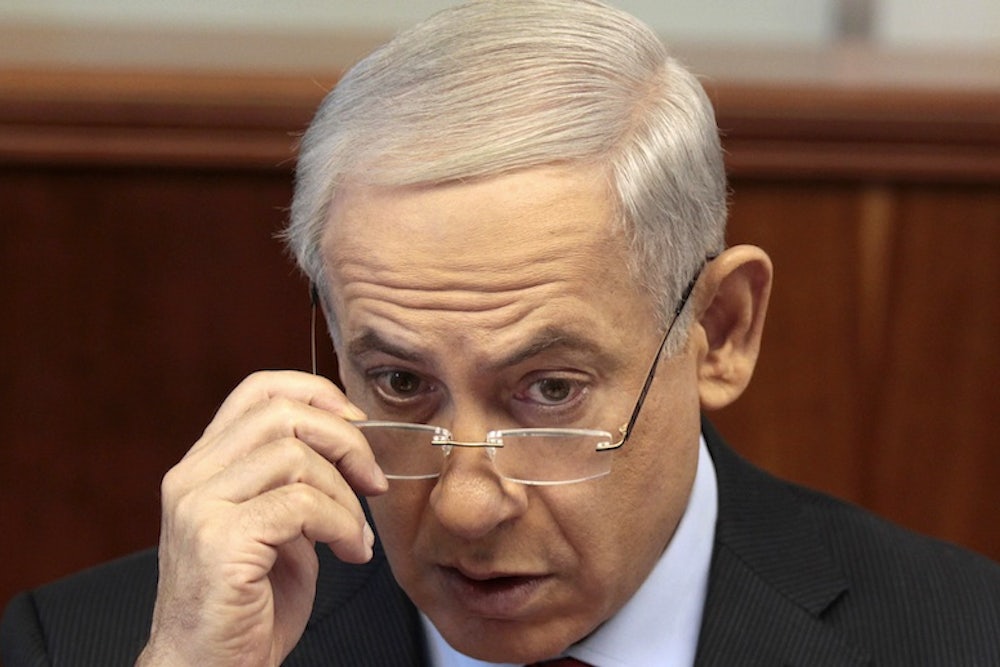The U.N. General Assembly in September is one of two times each year that Israeli Prime Minister Benjamin Netanyahu can virtually guarantee himself space in the U.S. media, the other being the AIPAC Conference every spring. Several times in past years, his government has used the weeks preceding these events to drum up concern over his top priority, which is halting Iran’s alleged nuclear weapons program, so that he can then come to America, put a capper on the weeks of chatter, and then, hopefully, extract promises from President Barack Obama—who, for the record, has pledged to prevent an Iranian nuclear bomb. To take just two examples: Israeli government sources provided ample quotes for two different articles, one in August 2010 and another in January 2012, suggesting that Israel was close to attacking Iran, kicking off much talk stateside and ending in renewed vows of U.S. support, roughly, for the Israeli position.
But this year, Bibi speaks in a climate not of his own making. The election of relatively moderate Iranian President Hassan Rouhani and subsequent diplomatic overtures between him and President Barack Obama have people really talking of a diplomatic deal. Mainstream validators like The New Yorker’s Laura Secor and Abbas Milani in The New Republic counsel cautious optimism, and former hawks like Kenneth Pollack suggest that containment is a viable option for a nuclear Iran.
This state of affairs, in a phrase, freaks Netanyahu out. He considers a nuclear-armed Iran an existential threat to his country, and has spent the past several years threatening to attack Iran’s nuclear facilities, both because he really just might and in order to pressure the Obama administration into making its own plans for a future attack. And he does not trust the prospect of a deal with Iran’s new president because Iran’s top leaders are unelected clerics who believe part of the purpose of the Islamic Republic is to “liberate” Jerusalem from “the Zionist entity.” In other words, there are many good reasons to be skeptical of a deal, even if it is probably worth trying to secure one anyway; distrust of Iranian diplomacy is one of Netanayahu’s more reasonable positions.
On Monday, Bibi tried to take some control of events in advance of his U.N. speech a week from Tuesday. An “Israeli official involved in drafting the speech” revealed to The New York Times that in his speech, Bibi will warn, “A bad agreement is worse than no agreement at all.” The official—who, if you met him, would probably bear a strong physical resemblance to Bibi’s right-hand man, future Israeli ambassador Ron Dermer—also said that Netanyahu will compare a hypothetical Iranian bargain to the various ones the U.S. has struck with North Korea, all of which turned out to be worth not even the paper they were written on.
The key paragraph in the Times article, actually, is the final one:
This year, Israeli officials fear, the highest drama may be Mr. Obama greeting Mr. Rouhani on the sidelines of the General Assembly, something that has not happened for decades and which they worry would leave Israel more isolated in dealing with Iran.
Much of the ideological disagreement between the Israeli and U.S. governments over how far Iran should be allowed to progress in its nuclear program and whether there should be an attack comes down to decidedly non-ideological differences. Chiefly: Israel is much closer to Iran, and therefore would be more threatened by a nuclear Iran; and Israel’s military ability to launch an effective strike against Iran’s nuclear facilities pales in comparison to the U.S.’s. (This is why Israel is especially activated over an underground enrichment facility called Fordo: It is buried so deep underground that it would likely withstand Israel’s most powerful bombs. But U.S. bunker-busters are believed capable of destroying it.)
Bibi does not want Israel to attack Iran—he wants the U.S. to attack Iran. And he is right to prefer that. But in order to urge the U.S. toward an attack, he needs to execute a delicate balancing act whereby he pushes the U.S. toward greater strictness while ultimately staying on the same page. Over the past four-and-a-half years, he has done an altogether exceptional job. But he was helped in no small part by the combination of cartoonishness and anti-Semitism of former President Mahmoud Ahmadinejad, an ideal enemy. And now Iran has this new guy making nice noises and even bringing Iran’s Jewish parliament member (Democrat from Great Neck?) to the U.N. Suddenly a deal does not seem so far-fetched.
And a deal is terrifying to Bibi because, of course, a bad agreement is worse than no agreement. Besides, he will ultimately almost certainly have to accept whatever deal gets made—remember, it is important that he stay on the same page as the U.S. So even though the best possible outcome is a legitimately good deal that conclusively ends the Iranian path to a nuclear weapon, it is cheaper (and, arguably, wiser) for Netanyahu instead to warn against a deal and implicitly advocate the continued threat of an American military strike.
Depending on how for-real Rouhani is, Netanyahu should be wary of doing this. A real deal would be great for Israel, too. If a nuclear Iran is Israel’s number-one nightmare, the aforementioned state of “more isolated” ought to be a close second.
